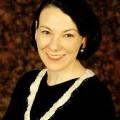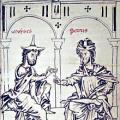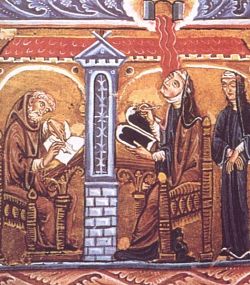221. Leading Light: Hildegard of Bingen
Posted on
The life, visions, political intrigues and scientific interests of Hildegard of Bingen.
Themes:
Further Reading
• Hildegard of Bingen, Selected Writings, trans. M. Atherton (London: 2001).
• Hildegard of Bingen, Scivias, trans. C. Hart and J. Bishop (New York: 1990).
• C. Burnett and P. Dronke (eds), Hildegard of Bingen: the Context of her Thought and Art (London: 1998).
• S. Flanagan, Hildegard of Bingen 1098-1179: a Visionary Life (London: 1998).
• B.M. Kienzle, D. Stoudt and G. Ferzoco (eds), A Companion to Hildegard of Bingen (Leiden: 2014).
• B. Newman (ed.) Voice of the Living Light: Hildegard of Bingen and her World (Berkeley: 1998).







Comments
In 2012, Pope Benedict XVI
In 2012, Pope Benedict XVI named St. Hildegard a Doctor of the Church for her contributions to theology - a rare distinction for anyone (only 36 have received the title since the 13th century) and still rarer for a woman (she is the fourth to be given the title, after Sts. Teresa of Avila, Catherine of Siena and Therese of Lisieux).
there is a good in our time
there is a good in our time podcast about Hildy
In reply to there is a good in our time by aS
IOT
Oh right, I actually meant to add that but then forgot. I'll do it now, thanks.
Hildegard of Bingen
I am inspired by Hildegard of Bingen. I can recommand this site www.healthyhildegard.com about her teachings. Blessings
Hidegard
Hi Peter this week radio 3 are doing a programme on Hildegard and her music.
Roman
In reply to Hidegard by Roman Prychidko
Hildegard
Oh really! Thanks, I will make sure to check that out and post it to "social media" as the kids like to say.
Gender and Revelations
Maintaining that everything she wrote is revealed truth sidesteps the issue of her credibility as a woman in the middle ages, I wonder how aware she was of this decision, she must have known that the commentaries on the visions were her own, but that claiming then as revealed truth allowed her to address an audience that would otherwise be deaf to her opinions. Did she convince herself of this revelation or was it a conscious decision? At one extreme (although unlikely) she might have made up her revelations to get her strong theological opinions heard (probably a pressing urge to her due to her fervent intellect). This, in my opinion, would make her into an even more interesting character. Then again, her own medieval opinions on gender might have led her to honestly believe that everything she said was revealed truth.
The Breath of God
Have been a huge fan of Hildegard's music since my sister brought home the album "A Feather on the Breath of God" back in the 80s; we were used to hearing Gregorian chant thanks to our father (who had it on 78s !), but this was the first time I'd heard plainchant performed by female voices and it was a revelation - absolutely sublime.
Music Through the Ages
Recently, I had the good fortune to attend a children's choir concert featuring female composers, and was delighted to find Hildegard among them. Her "O Vivens Fons" rang out as true and pure on the lips of the young contemporary vocalists as I imagine it must have on those of the cloistered novitiates centuries ago. Thank you, Peter, for providing the background and context to better appreciate Hildegard's work.
Sculpture
A bust of her was just added to the Sydney Conservatorium as part of a project to acknowledge more women in the history of music - link here.
In reply to Sculpture by Brian Weatherson
Sculptures
And Nina Simone too! We mentioned her in the Phyllis Wheatley episode. Maybe someone at that museum listens to the podcast...?
Appreciation
Thank you, Peter.
Add new comment